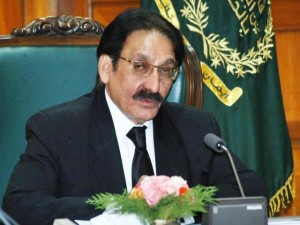Will not let judiciary to be maligned; says Chief Justice Iftikhar Chaudhary
Wednesday, January 30th, 2013 4:37:05 by Web Desk
The Supreme Court on Wednesday directed authorities to submit a copy of a letter written by National Accountability Bureau (NAB) chairman Admiral (retd) Fasih Bokhari to President Asif Ali Zardari in which he had accused the apex court of pressurising NAB officers and of interfering in their duties.
A three-member bench of the apex court, headed by Chief Justice Iftikhar Muhammad Chaudhry, heard the case concerning implementation of its March 2012 ruling in the rental power projects (RPP) case.
During today’s hearing, the chief justice inquired NAB Prosecutor General K K Agha on the bureau chairman’s letter to the president expressing reservations over the judiciary.
Chief Justice Iftikhar said the court would examine the contents of the letter to determine the reasons that may have led Bokhari to draft it.
“We want to determine whether the letter was written in an effort to pressurise the court or to spread hatred against the judiciary,” said the chief justice. “We are very serious about this and will not allow the judiciary to be maligned by anyone.”
“We did not allow a military dictator to interfere in the court’s proceedings, how we can allow the NAB chairman to do so?”
The apex court then issued written orders to authorities to submit a verified copy of the said letter and to also determine and inform the court as to how it was released to the media. The hearing was subsequently adjourned until Thursday. The court had earlier decided to hold day-to-day hearings of the RPP implementation case.
Short URL: https://www.newspakistan.pk/?p=37821


















When we review the role of the Judiciary, opposition political parties and other politically and socially active circles, one does not feel optimistic about their capacity to pull Pakistan out of the present predicament. The opposition devote less time to the acute social and economic problems and the security issues and pay more attention to narrow partisan interests and frivolous issues or raise high sounding slogans that in no way focus on the real issues. There are serious problems of priorities with the political leaders. The opposition parties talk of issues when they intend to criticize the government. However, they pay very little or no attention to developing consensus among them on ways and means to resolve major issues. Nor do they offer any concrete and practical plan of action to achieve these goals. The opposition parties are busy with their partisan agendas, focusing on immediate power-interests of either staying in power at any cost or making life difficult for the government.